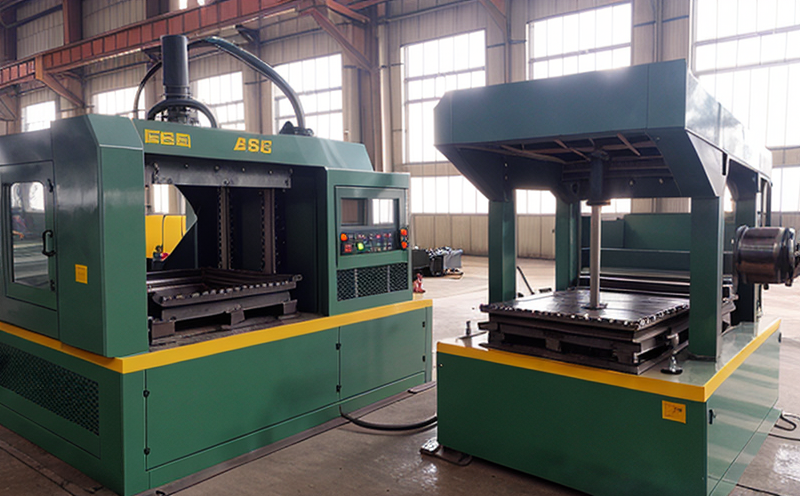ISO 4987 Penetrant Testing of Forged Surfaces
The ISO 4987 Penetrant Testing of Forged Surfaces service is designed to evaluate the integrity and quality of forged components. This process, governed by ISO standards, ensures that critical industrial parts meet stringent requirements for safety and durability in various applications such as aerospace, automotive, and construction.
The penetrant testing technique involves applying a dye or fluorescent liquid to the surface of a forged part. After drying, an emulsifier is applied followed by the developer, which draws out any defects on the surface. This non-destructive testing (NDT) method allows for the detection of surface-breaking flaws that could compromise the structural integrity of the component.
Forging processes subject materials to high stresses and temperatures, which may lead to internal cracks or other imperfections that are not detectable by visual inspection alone. ISO 4987 penetrant testing provides a reliable means of identifying these issues early in the manufacturing process, ensuring only defect-free parts reach subsequent stages.
This service is particularly important for industries where component failure can result in significant costs and safety risks. By adhering to international standards like ISO 4987, manufacturers demonstrate their commitment to quality control and compliance with industry best practices.
The testing process typically involves several steps:
- Initial cleaning of the test specimen
- Application of penetrant dye or fluorescent liquid
- Drying period for the penetrant to seep into defects
- Cleaning excess penetrant from the surface
- Application of developer to draw out any remaining penetrant in flaws
- Evaluation under appropriate lighting conditions (visible light or UV light depending on dye type)
- Recording and reporting results according to ISO 4987 guidelines
The use of advanced equipment such as ultraviolet lamps enhances the visibility of defects, allowing for more accurate assessments. This service ensures that forged components meet stringent quality requirements before they are integrated into larger assemblies or shipped to end-users.
Our team of experts ensures meticulous adherence to ISO 4987 standards throughout every stage of the testing process. From specimen preparation to final reporting, we leverage our deep expertise in industrial manufacturing and processing to deliver reliable results that meet your quality expectations.
Eurolab Advantages
EuroLab offers unmatched precision and reliability for ISO 4987 penetrant testing of forged surfaces. Our state-of-the-art facilities, coupled with years of experience in industrial manufacturing and processing, set us apart from other service providers.
- Accurate and Consistent Results: We employ highly trained technicians who adhere strictly to ISO 4987 guidelines, ensuring consistent outcomes across all tests. Our advanced equipment guarantees accurate readings even under challenging conditions.
- Comprehensive Reporting: Our comprehensive reports provide detailed insights into the condition of your forged components, highlighting any defects found and offering recommendations for necessary actions. This transparency helps you make informed decisions about production processes.
- Efficient Turnaround Times: By streamlining our workflow and leveraging our extensive experience, we can deliver timely results without compromising on quality. Quick turnaround times are especially crucial in industries where product availability impacts operational efficiency.
- Comprehensive Training Programs: To support your workforce’s growth and development, EuroLab offers tailored training programs focusing specifically on penetrant testing techniques relevant to industrial applications. These sessions not only enhance employee skills but also foster a culture of continuous improvement within your organization.
- Global Compliance: Our commitment to maintaining global standards ensures that our services are compliant with international regulations applicable to various sectors including automotive, aerospace, and construction industries.
Choose EuroLab for ISO 4987 penetrant testing of forged surfaces. With us, you can rest assured knowing your components will undergo rigorous scrutiny aimed at preventing potential failures in their intended applications.
Customer Impact and Satisfaction
The impact of ISO 4987 penetrant testing on our customers extends far beyond mere compliance with industry standards. By leveraging this service, manufacturers experience numerous benefits that contribute directly to business success:
- Improved Product Quality: Detecting surface-breaking flaws early in the production cycle ensures that only defect-free components enter subsequent stages of manufacturing or reach end-users.
- Enhanced Safety Standards: Non-destructive testing methods like penetrant inspection play a crucial role in maintaining high safety standards, especially for critical parts used in high-risk environments such as aircraft engines and pressurized containers.
- Cost Efficiency: Early identification of defects through penetrant testing reduces rework costs associated with manufacturing defectives. It also minimizes warranty claims by ensuring that only reliable products are delivered to customers.
- Increased Customer Trust: Demonstrating adherence to international standards like ISO 4987 builds trust among clients, partners, and stakeholders who value quality assurance processes.
- Competitive Advantage: Staying ahead of competitors by offering superior product reliability fosters customer loyalty and opens doors for new business opportunities.
Our focus on delivering exceptional service has earned us high levels of customer satisfaction. Many of our clients report increased confidence in their products' quality, leading to improved market performance and stronger brand reputation.
Environmental and Sustainability Contributions
- Eco-Friendly Processes: EuroLab prioritizes the use of environmentally friendly materials and techniques during penetrant testing. Our commitment to sustainability includes reducing waste generation, minimizing energy consumption, and promoting recycling wherever possible.
- Resource Conservation: By ensuring that only defect-free components pass through further stages of manufacturing or reach customers, we help conserve resources by preventing the production of unnecessary replacements for defective parts.
- Emissions Reduction: Our efficient testing processes contribute to reduced emissions from transportation as our clients can rely on reliable first-time inspections without needing additional tests due to failed initial inspections.
At EuroLab, we recognize that business success and environmental responsibility go hand in hand. Through our ISO 4987 penetrant testing service, we strive not only to meet regulatory requirements but also to contribute positively to the environment and society at large.





